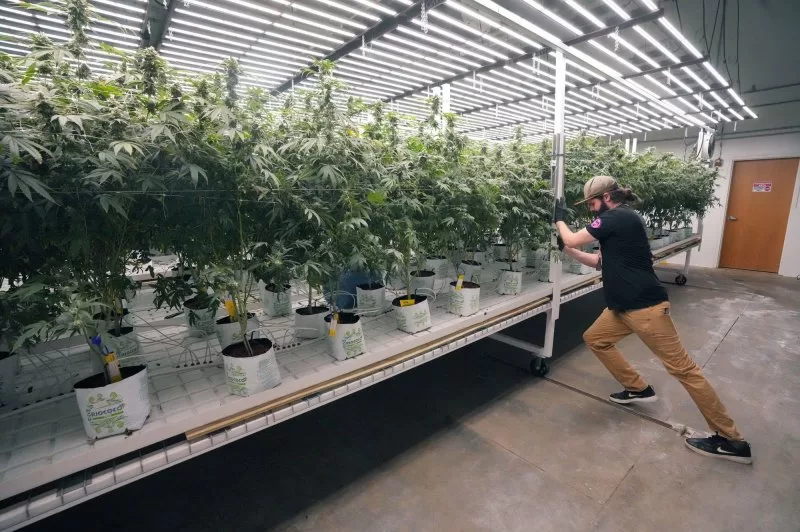1 of 5 | A worker pushes a row of cannabis plants in a grow room at the Beleaf Medical Growing Facility in Earth City, Mo., in 2023. On Tuesday, the U.S. Drug Enforcement Administration agreed to reclassify cannabis, removing its association with deadly drugs such as heroin and LSD and acknowledging that it has moderate to low risk for users. File Photo by Bill Greenblatt/UPI |
License PhotoApril 30 (UPI) — In a historic move that does not legalize adult-use marijuana nationwide but eases its restrictions, the U.S. Drug Enforcement Administration on Tuesday agreed to reclassify cannabis, removing its association with deadly drugs such as heroin and LSD and acknowledging that it has moderate to low risk for users.
An interim rule on the reclassification of marijuana from Schedule I to Schedule III under the Controlled Substance Act is expected soon by the DEA, sources told NBC News and cannabis news site Marijuana Moment.
The Justice Department, a Biden administration official said, “continues to work on this rule.” They added that the administration has “no further comment at this time.”
The National Organization for the Reform of Marijuana Laws praised the move, saying cannabis — so far a $34 billion industry despite its patchwork of legality in different states — has remained classified as a Schedule I controlled substance since 1970. Still, the group said it would prefer for marijuana to be removed from all DEA drug classifications.
It was “significant” for the DEA and FDA “to acknowledge publicly for the first time what many patients and advocates have known for decades: that cannabis is a safe and effective therapeutic agent for tens of millions of Americans,” NORML Deputy Director Paul Armentano, said.
A poll taken last year suggests that overall support for national marijuana legalization was at an all-time high at 70%.
Drugs, substances and chemicals used to make drugs are classified into five distinct categories, according to the DEA. Schedule I drugs are seen as having little medical or beneficial use. Schedule II drugs — which include meth, cocaine and drugs such as Adderall and Ritalin — are viewed as highly addictive and risky.
Schedule III drugs and substances, though, are viewed by the DEA as having “a low potential for abuse and low risk of dependence.”
President Joe Biden in October 2022 made a move to review the classification of marijuana as a Schedule I drug, which was the first time that an American president had call for such a change.
Referring to the United States’ opioid crisis, Biden noted at the time that marijuana is scheduled “even higher than fentanyl and methamphetamine — the drugs that are driving our overdose epidemic.”
A recent study found that, despite decades of fearmongering by some health officials and many law-enforcement authorities, marijuana isn’t a gateway drug that can spark a person’s desire to try narcotics.
“Just as it is intellectually dishonest and impractical to categorize cannabis in the same placement as heroin,” Armentano said, “it is equally disingenuous and unfeasible to treat cannabis in the same manner as anabolic steroids and ketamine,” the NORML spokesman added.
Twenty-four states and Washington, D.C., have legalized recreational marijuana, with 20 of those states approving registration for marijuana retail businesses. Thirty-eight states have legalized medical marijuana.
In January, Assistant Secretary of Health Rachel Levine had asked the DEA to reclassify marijuana following a review.
That was followed days ago in a letter to the DEA by congressional Democrats, urging the DEA to “swiftly” reschedule marijuana’s drug status. Lawmakers in the letter reiterated their call for the drug to be descheduled entirely, noting that alcohol, which has more adverse health risks, is not scheduled at all under the CSA.
However, NORML points out how the DEA’s rescheduling decision, once formalized, will not take immediate effect in order to leave time for further public debate on the issue.
But while Biden’s policy change does not legalize the plant, the marijuana industry is expected to see benefits nonetheless such as an elimination of certain tax burdens in states in which adult-use marijuana is currently legal.
Congress is currently debating a number of marijauna-related bills in front of them, such as the SAFER Banking Act and HOPE Act.
Minnesota Sen. Tina Smith, a Democrat who introduced a 2020 bill to remove cannabis from the Controlled Substances Act, on Tuesday reiterated that marijuana is not as dangerous as heroin and that “there is no reason” for marijuana “to be in the same class of controlled substances” such as drugs like heroin.
“We should celebrate the fact we’re finally changing course from the failed, racist legacy of the War on Drugs,” Smith posted on X.
Monday on social media, U.S. Rep. Nancy Mace, a South Carolina Republican and one of a handful in her conference who agree with Democrats on the issue, urged Senate Majority Leader Chuck Schumer, D-N.Y., to pass the Safe Banking Act and to “stop holding” the bill in Congress “as a campaign carrot.”
Attorney General Merrick Garland could submit the proposal as early as Tuesday.

